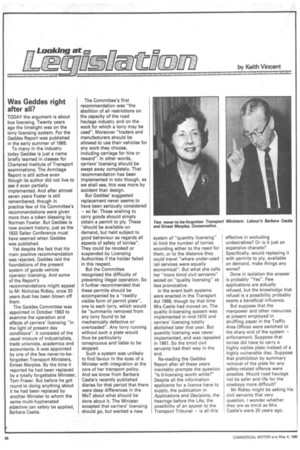Was Geddes right after all?
Page 70

If you've noticed an error in this article please click here to report it so we can fix it.
TODAY the argument is about bus licensing. Twenty years ago the limelight was on the lorry licensing system. For the Geddes Report was published in the early summer of 1965.
To many in the industry today Geddes is just a name briefly learned in classes for Chartered Institute of Transport examinations. The Armitage Report is still active even though its author did not live to see it even partially implemented. And after almost seven years Foster is still remembered, though in practice few of his Committee's recommendations were given more than a token blessing by Norman Fowler. But Geddes is now ancient history, just as the 1933 Salter Conference must have seemed when Geddes was published.
Yet despite the fact that his main positive recommendation was rejected, Geddes laid the foundations of the present system of goods vehicle operator licensing. And some of the Report's recommendations might appeal to Mr Nicholas Ridley, once 20 years dust has been blown off them.
The Geddes Committee was appointed in October 1963 to examine the operation and effects of carriers' licensing "in the light of present day conditions". It consisted of the usual mixture of industrialists, trade unionists, academics and accountants. It was appointed by one of the few never-to-beforgotten Transport Ministers, Ernest Marples. By the time it reported he had been replaced by a totally forgettable Minister, Tom Fraser. But before he got round to doing anything about it he had been replaced by another Minister to whom the same multi-hyphenated adjective can safely be applied, Barbara Castle.
The Committee's first recommendation was "the abolition of all restrictions on the capacity of the road haulage industry and on thework for which a lorry may be used". Moreover "traders and manufacturers should be allowed to use their vehicles for any work they choose, including carriage for hire or reward". In other words, carriers' licensing should be swept away completely. That recommendation has been implemented in toto though, as we shall see, this was more by accident than design.
But Geddes' suggested replacement never seems to have been seriously considered — so far. Those wishing to carry goods should simply obtain a permit to ply. These "should be available on demand, but held subject to good behaviour as regards all aspects of safety of lorries". They could be revoked or suspended by Licensing Authorities if the holder failed in this respect.
But the Committee recognised the difficulty of preventing illegal operation. So it further recommended that these permits should be accompanied by a "readily visible form of permit plate", one to each lorry, which would be "summarily removed from any lorry found to be mechanically defective or overloaded". Any lorry running without such a plate would thus be particularly conspicuous and liable to be stopped.
Such a system was unlikely to find favour in the eyes of a Minister with integration at the core of her transport policy. And we know from Barbara Castle's recently published diaries for that period that there were deep differences in the MoT about what should be done about it. The Minister accepted that carriers' licensing should go, but wanted a new
system of "quantity licensing" to limit the number of lorries according either to the need for them, or to the distance they could travel "where under-used rail services were equally economical". But what she calls her "more timid civil servants" seized on "quality licensing" as less provocative.
In the event both systems were enacted in the Transport Act 1968, though by that time Mrs Castle had moved on. The quality 0-licensing system was implemented in mid-1970 and carriers' licensing totally abolished later that year. But quantity licensing was never implemented, and was repealed in 1981. So the timid civil servants had their way in the end.
Re-reading the Geddes
Report after all these years inevitably prompts the question "Is 0-licensing worth while?" Despite all the information applicants for a licence have to supply, the publication in Applications and Decisions, the hearings before the LAs, the possibility of an appeal to the Transport Tribunal — is all this
effective in excluding undesirables? Or is it just an expensive charade?
Specifically, would replacing it with permits to ply, available on demand, make things any worse?
Done in isolation the answer is probably "Yes". Few applications are actually refused, but the knowledge that refusal is a possibility probably exerts a beneficial influence.
But suppose that the manpower and other resources at present employed in shuffling paper in the Traffic Area Offices were switched to the sharp end of the system — enforcement. Suppose that lorries did have to carry a highly visible plate instead of a highly vulnerable disc. Suppose that prohibition by summary removal of the plate for any safety-related offence were possible. Would road haulage not be safer and life for the cowboys more difficult?
Mr Ridley might be asking his civil servants that very question. I wonder whether they are as timid as Mrs Castle's were 20 years ago.




































































































